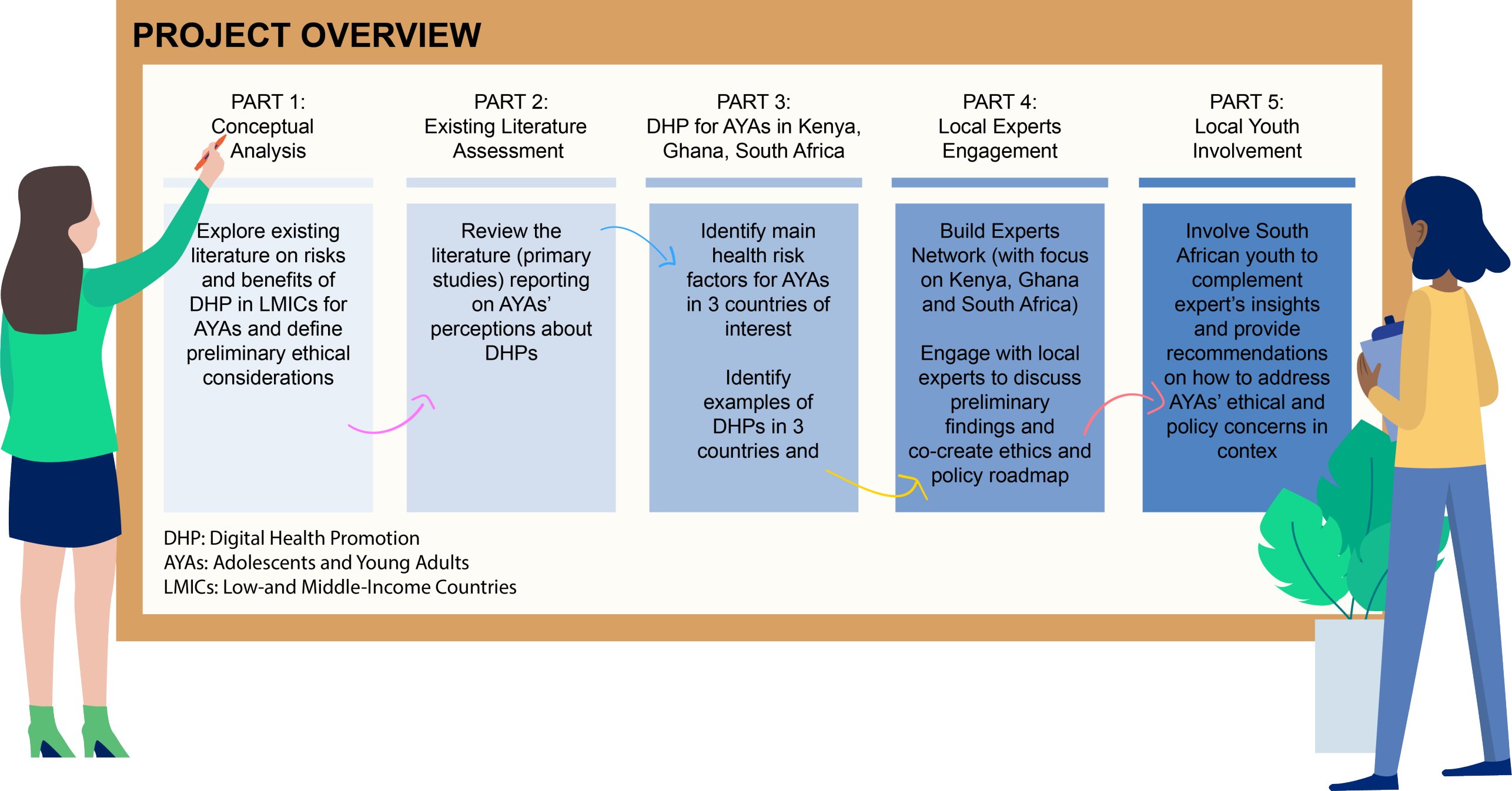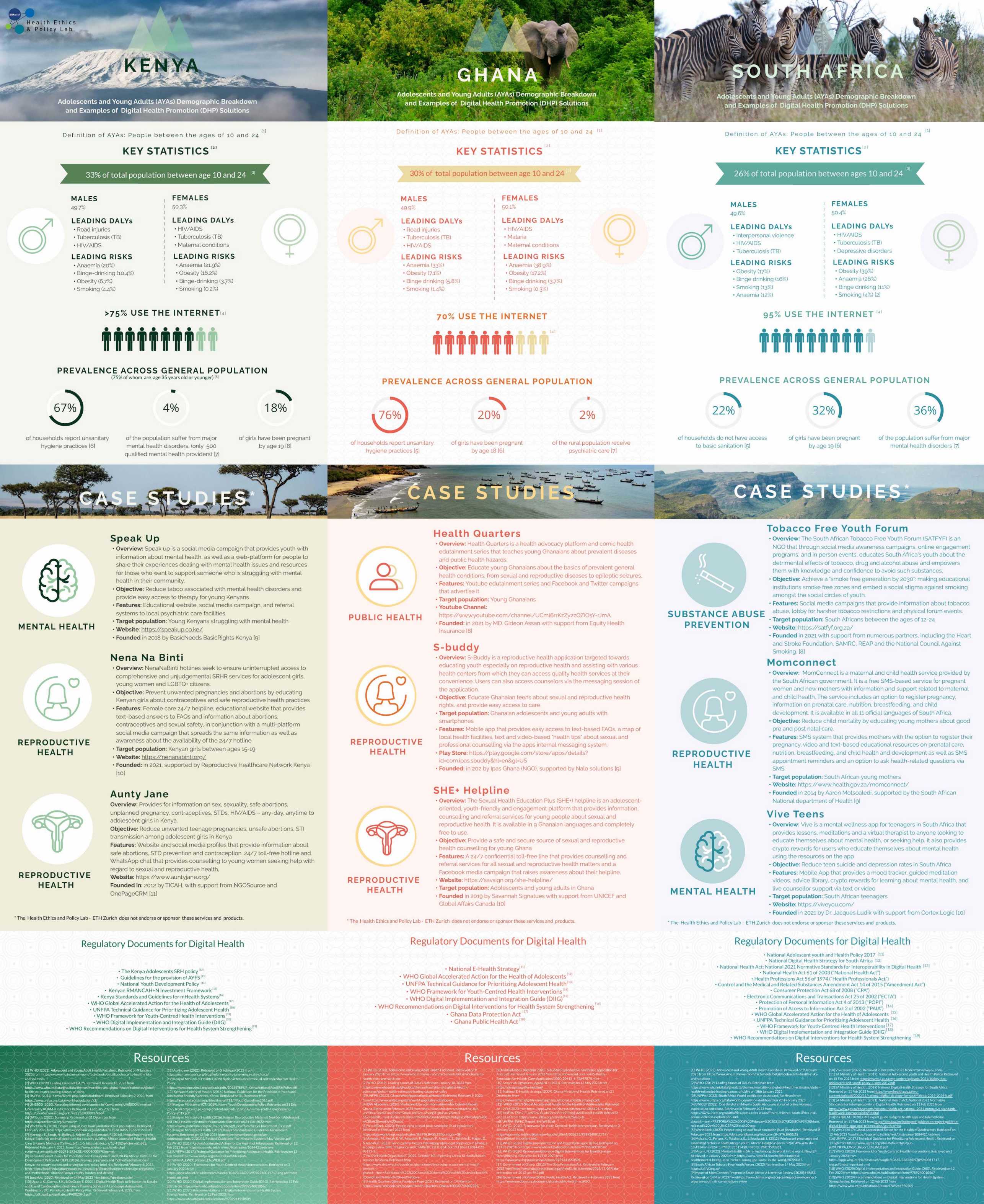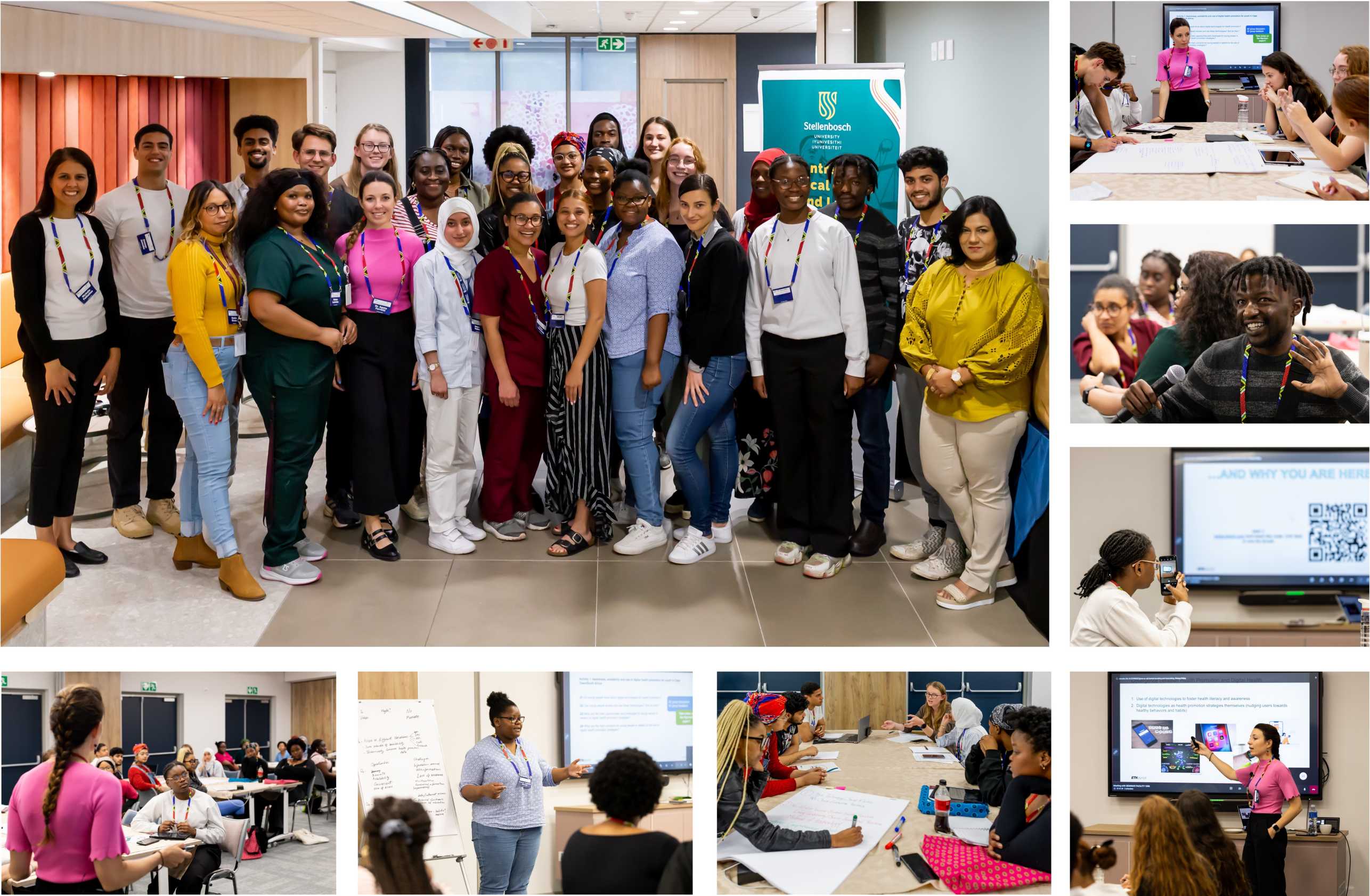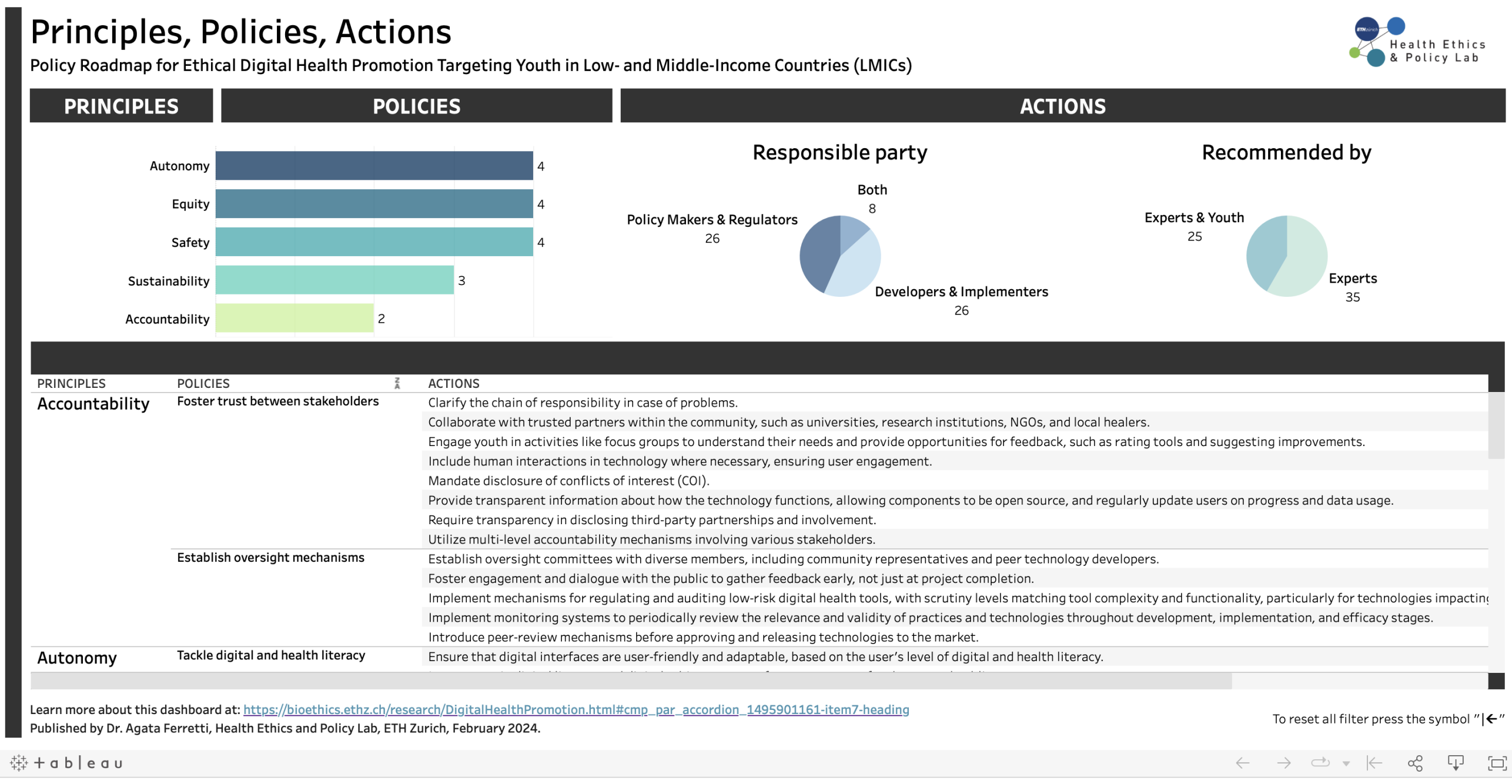Digital Health Promotion (DHP)
Enabling digital health promotion for adolescents and young adults in low- and middle-income countries: ethics and policy guidance.

Project Background
People worldwide have increasingly adopted digital technologies (such as mobile apps, wearables, and AI-powered devices) to help monitor and improve their health. Young people in particular, as digital natives, are increasingly embracing these technologies. Digital health promotion (DHP) strategies include for example the implementation of reproductive health education programs via social media, interaction with AI-powered chatbots and games to support wellness and mental health awareness, or the use of wearable devices to motivate an active lifestyle.
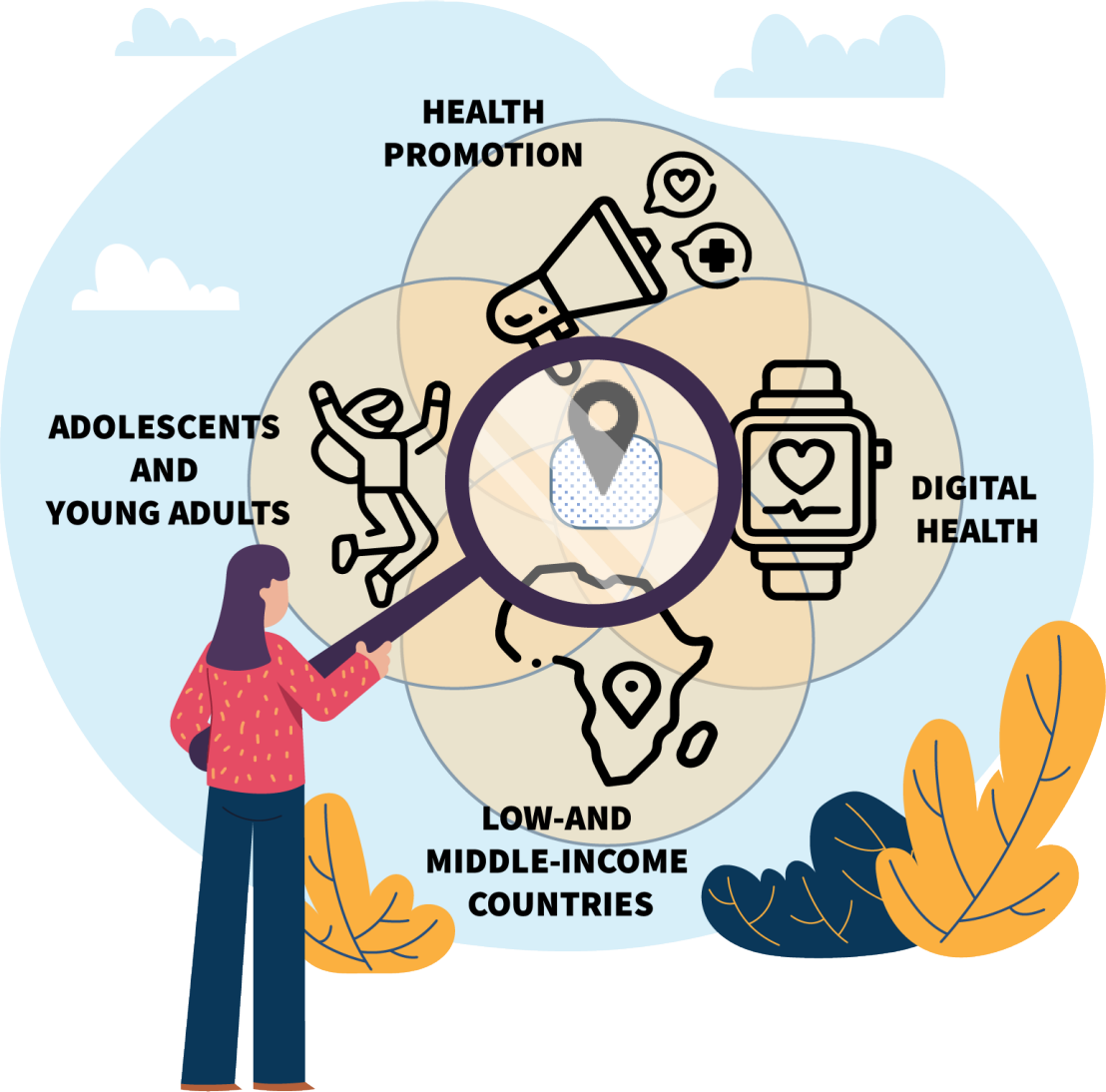
Despite their great potential, little research to date has examined how digital technologies can help promote the health and well-being of adolescents and young adults (AYAs), especially those in low- and middle-income countries (LMICs). Our project “Enabling digital health promotion for adolescents and young adults in low- and middle-income countries: ethics and policy guidance” aims to fill this gap, as well as explore the opportunities and the ethical challenges of DHP in LMICs. This project has a special focus on three sub-Saharan African countries: South Africa, Kenya and Ghana.
The research area at the intesection of digital health, health promotion, adolescents and young adults, and low and middle income settings (in particular Sub-Saharan Africa) remains underexplored. Our project on Digital Health Promotion aims at investigating and contributing to filling this gap. Mapping the ethical issues and policy gaps in this domain is key to ensuring safe and beneficial technology development and use.
Project Aim:
The aim of this project is to explore the potential of digital health promotion in Low- and Middle-Income Countries (LMICs), with a specific focus on Kenya, Ghana, and South Africa. Our primary objectives are to address ethical and policy issues, learn from young people, create a network of local experts, and inform the development of context-specific digital health promotion applications.
Key Goals:
- Address Ethical and Policy Issues: Our goal is to identify and examine the ethical and policy considerations surrounding digital health promotion for youth in LMICs. By analyzing existing frameworks and regulations, we aim to highlight strengths, gaps, and areas for improvement in the implementation of digital health interventions.
- Learn from Young People: We aim to engage with and learn from adolescents and young adults in LMICs to understand their perspectives on digital health promotion. Their opinions, expectations, and criticisms give valuable insight into the most pressing ethical issues and thus help shape our approach.
- Create a Network of Local Experts: To ensure the project's relevance and impact, we aim to build a network of interdisciplinary experts from the fields of ethics, policy, youth healthcare, technology development, and public engagement. This network will foster collaboration, exchange of views, and knowledge sharing regarding digital health promotion in LMICs, enhancing the analysis and conclusions drawn from the literature.
- Inform Development of Digital Health Promotion Strategies: Through our research and findings, we aim to provide valuable insights to guide the development of targeted digital health promotion applications for LMICs. By identifying best practices and successful case studies, we will contribute to the creation of effective, context-specific solutions that address the unique challenges in these countries.
Project overview
Part 1: Conceptual Analysis
In order to discover the ethical, social, and policy considerations for the use of digital technologies for health promotion among youth in low- and middle-income countries (LMICs), we conducted a critical conceptual analysis of the research literature. Based on this endeavor, we identified preliminary opportunities, limitations, and ethical considerations that are specific to the implementation of digital health promotion (DHP) for young people in these settings.
Part 2: Existing Literature Assessment: Youth Perspectives on DHP
To understand how young people themselves, as the target population, view digital technologies as tools for health promotion, we reviewed primary research studies seeking out the views and opinions of adolescents and young adults (AYAs) on this topic. These studies were conducted among youth in a wide range of countries worldwide, and reported young people’s thoughts and reflections about engaging with various forms of digital health promotion, utilized across different areas of health.
Part 3:Examples of DHP for youth in Ghana, Kenya, and South Africa
We clarified the primary health risks for young people in Ghana, Kenya, and South Africa, our selected countries of focus in the Sub-Saharan Africa region. Subsequently, we identified examples of digital health promotion initiatives in these countries and developed a taxonomy by systematically classifying them based on relevant characteristics. As a result, we can identify potential gaps in which DHP could contribute to fostering health promotion objectives in the countries of interest, while also uncovering potential limitations and shortcomings of existing DHP solutions.
Part 4: Local Experts Engagement
With a focus on Ghana, Kenya, and South Africa, we built a network of local experts in the area of digital health promotion for young people. This network included developers, youth advocates, policy makers, and academics, who met to discuss the project’s preliminary findings. Their collaboration enabled the formation of a backbone ethical framework for digital health promotion for young people in this region of Africa.
Part 5: Local Youth Involvement
We conducted a consultative workshop with Stellenbosch University's Faculty of Medicine and Health Sciences students in South Africa. Using co-design, we gathered their insights on digital tools for health promotion among youth in South Africa. The objectives were to explore their perspectives on digital health promotion, identify opportunities, challenges, and ethical concerns, and generate ideas for improving ethical frameworks and aligning with young people's needs in digital health promotion.
The DHP project is led by a team of researchers from the Health Ethics and Policy Lab, ETH Zurich.
Project Team
- Agata Ferretti
Project Leader and Senior Researcher at the Health Ethics and Policy Lab, ETH Zurich - Effy Vayena
Principal Investigator and Professor of Bioethics at the Health Ethics and Policy Lab, ETH Zurich - Alessandro Blasimme
Co-Principal Investigator and Senior Scientist at the Health Ethics and Policy Lab, ETH Zurich - Shannon Hubbs
Scientific Research Assistant at the Health Ethics and Policy Lab, ETH Zurich
Collaborating Institutions
International Collaborators
- external pageKwame Adjeicall_made
Researcher, Kintampo Health Research Centre, Research and Development Division, Ghana Health Service - external pageJoseph Alicall_made
Assistant Professor, Dept. of International Health, Johns Hopkins Bloomberg School of Public Health & Associate Director for Global Programs, Johns Hopkins Berman Institute of Bioethics - external pageCaesar Atuirecall_made
Ethics Lead, MSc in International Health and Tropical Medicine, Oxford University & Associate Professor, Department of Philosophy and Classics, University of Ghana - external pageTambe Betrand Ayukcall_made
Senior Lecturer and Coordinator, Department of Public Health and Hygiene, Faculty of Health Sciences, University of Buea, Cameroon - external pageBolade Banougnincall_made
Program Data Analyst, United Nations Population Fund, West and Central Africa Regional Office, Dakar, Senegal - external pageNiresh Bhagwandincall_made
Executive Manager, Strategic Research Initiatives, South Africa Medical Research Council (MRC) - Nezerith Cengiz
Researcher, Centre for Medical Ethics and Law, Stellenbosch University - external pageRichard Dzikunucall_made
Action Learning Groups Lead, Yeld Hub - external pageJudy Gichoyacall_made
Assistant Professor, Department of Radiology and Informatics at Emory University & NIH data Scholar Supporting the DSI Africa Project - Mogammad Amaan Jamalie
Medical Student, Stellenbosch University - external pageDaudi Jjingocall_made
Lecturer & Director, African Center of Excellence in Bioinformatics and Data Science, Makerere University, Kampala, Uganda - external pageDamian Jumacall_made
Lancet Youth Leader and Healthy Brains Global Initiative - Wiaan Kotze
Medical Student, Stellenbosch University - Carleigh Krubiner
Bioethics Lead, Wellcome Trust - Katherine Littler
Co-Lead of the Health Ethics & Goverance Unit, Research for Health Department, Sceince Division, World Health Organization - external pageMelissa McCraddencall_made
Bioethicist, Department of Bioethics at The Hospital for Sick Children (SickKids) - external pageKeymanthri Moodleycall_made
Professor in the Department of Medicine and Director of the Centre for Medical Ethics and Law, Faculty of Health Sciences, Stellenbosch University - external pageMeshandren Naidoocall_made
PhD Fellow in Health Law and Bioethics, University of KwaZulu-Natal - external pageGonasagrie (Lulu) Naircall_made
Senior Lecturer, Centre for Medical Ethics and Law, Stellenbosch University - external pageKingsley Obeng-Kyerehcall_made
Executive Coordinator of the Children and Youth in Broadcasting (CYIB) CURIOUS MINDS - Kedebone Oliver
Genesis Analytics, Health Practice Area, Cape Town, South Africa - external pageDimpho Ralefalacall_made
Assistant Director, Office of Research and Development, University of Botswana, Gaborone, Botswana - external pageElona Toskacall_made
Chief Research Officer, Centre for Social Science Research, University of Cape Town - external pageFrederick Murunga Wekesahcall_made
Co-leader of adolescent/youth mental health research at the African Population and Health Research Center (APHRC) - Jonty Wright
Medical Student, Stellenbosch University & Founder of Save7
General considerations based on our external pagenarrative reviewcall_made of the scientific literature.
- Ethical challenges specific to implementing digital health promotion for young people in low- or middle-income country settings have not been explored in depth in the research literature.
- Digital health promotion can complement traditional public health efforts by expanding access to more individuals, offering personalized content, and supporting positive health choices in the influential early years of life. Failure to realize its potential will leave many health needs unmet.
- Significant barriers can limit the effectiveness of DHP for young people. The digital divide and realities of structural injustice in data practices, as well as fair distribution of benefits, must be taken into account, in order for DHP efforts to be truly effective and beneficial for all. Health data privacy and safeguards against misinformation are essential to ensure safety and security for users. Finally, DHP cannot act as a substitute for addressing widespread socioeconomic determinants of health in the population of youth in a given country.
- The literature assessment yielded several important recommendations. Social determinants of health among the youth population must be addressed, while low-cost DHP might simultaneously be deployed as a timely response to health challenges. Funding for IT infrastructure and broadband internet access should be increased, together with DHP content in local languages that promotes greater autonomy in LMICs, with access to digital technologies understood as one social determinant of health. Safety, in terms of data privacy, attention to bias, and scientifically reliable interventions, must be guaranteed. Technology for health requires appropriate oversight, with ethical standards clearly defined. Finally, engaging members of the local target population is essential to address needs that are specific to their economic, cultural, and social context.
Specific findings from our scoping external pageliterature reviewcall_made examining youth perspectives on DHP.
- Adolescents and young adults are receptive towards using digital tools for health promotion, in particular formats such as mobile applications and social media, and see technology as extending the reach of traditional healthcare.
- Young people express nuanced views concerning the importance of aspects such as confidentiality and need for a safe space to engage with digital health promotion tools, varying from one area of health to another. A clear and user-friendly format, and information that is brief and direct, were mentioned as appealing characteristics in DHP tools, while youth expressed concern over qualities such as technological friction or a lack of personalization.
- There is a need to better understand views of young people in the Global South, whose voices are underrepresented in the research literature on the topic of digital tools for promotion of health. Of the studies included in the scoping review, only 9 out of 50 reported perspectives from youth in LMICs.
Key discussion points emerged during the Experts Workshop on How to Unlock the Potential of Digital Health Promotion for Young People in LMICs
- Despite the increasing availability of DHPs technologies for young people in LMICs, there has been a notable absence of research on whether the existing ethical and policy frameworks are adequate to address the challenges and opportunities in these settings. The workshop aimed to contribute to filling this gap by bringing together experts from various fields to explore the ethics and governance of DHP for young people in LMICs.
- Workshop participants highlighted the absence of specific ethical frameworks tailored to DHP for youth in LMICs, suggesting that existing digital health ethics principles should serve as a foundation but need further refinement and adaptation based on local youth input. Some level of regulation of digital health promotion tools and developers can enhance technology's reputation and encourage youth adoption.
- Participants recognized the need to address barriers and shortcomings in DHP adoption in LMICs to ensure young people can fully benefit from these technologies. To do so, ethical considerations relevant to the local context must be carefully analyzed and addressed, and ethical frameworks tailored, ensuring that policies facilitate effective implementation of principles. Concepts of autonomy, equity, safety, accountability, and sustainability should be interpreted in the context of the specific values and socio-cultural perspectives of Sub-Saharan Africa, rather than relying solely on a Western-centric interpretation of these principles, as effectiveness can be weakened when applied in vastly different contexts.
- The workshop's work has led to the potential translation of these five fundamental ethical principles into principles into concrete policy recommendations. The resulting policy roadmap calls on policy makers, regulators, developers, and implementers to take specific actions to establish more ethically aligned DHPs that prioritize the needs and well-being of young people, particularly in LMICs in Sub-Saharan Africa. It emphasizes the importance of incorporating local perspectives, values, and youth-centered considerations to ensure that DHP technologies are not only ethically sound, but also effective and accessible.
Findings from out taxonomy study analysis examining selected examples of DHP for youth in Ghana, Kenya, and South Africa.
- The study identified 31 DHP tools in Ghana, Kenya, and South Africa. The most common health focus among these tools was sexual and reproductive health, with funding primarily originating from local NGOs, foundations, and international organizations. These tools were predominantly web- and social media-based, aiming to expand health knowledge and access for young people.
- Ethical principles are relevant in the development and deployment of DHP tools. The study highlights the need for inclusiveness, equity, transparency, effectiveness, and personalization in these technologies. Neglecting ethical considerations can jeopardize the quality and safety of DHPs.
- Engaging with young people in meaningful ways to understand their concerns is crucial in the development of DHP tools. As research on youth perspectives on digital health progresses, technology development should adapt and incorporate this knowledge and feedback to create sustainable and effective tools. Additionally, increasing investment in the health sector and empowering local developers is crucial for expanding access to DHPs in low- and middle-income countries.
Key elements emerging during the South African youth engagement workshop.
- During the workshop, South African medical students emphasized the prevalence of digital health promotion tools among young people in their country. They acknowledged that digital technologies are already being used for health promotion yet such tools are not equally distributed among young South Africans.
- The workshop participants raised a series of ethical concerns related to digital health promotion. These concerns revolved around five core areas: autonomy, privacy, equity, safety, and accountability. They questioned the level of autonomy young people have in utilizing digital health tools, discussed the importance of safeguarding individuals' personal health data, highlighted the challenge of addressing socioeconomic inequalities and ensuring universal access, underscored the need for reliable and valid health information in digital platforms, and stressed the importance of clear accountability in the development and deployment of these tools.
- During the workshop, participants offered valuable suggestions to improve the development and use of digital health promotionfor youth in South Africa. Firstly, they recommended to implement oversight mechanisms to assess and ensure the safety and effectiveness of DHPs. Secondly, it was suggested that young people should be actively engaged in the design and development of health promotion tools to address their unique concerns and needs effectively. Additionally, the importance of increased investment in digital education was emphasized, to equip young individuals with the necessary skills and knowledge to make the most of digital health promotion resources. Lastly, participants underlined the necessity of addressing the digital divide, ensuring that digital health promotion solutions are accessible to all South African youth, regardless of their socioeconomic or geographic circumstances.
This project produced peer-reviewed publications published in international outlets.
- Ferretti, A., Vayena, E., Blasimme, A. (2023). Unlock Digital Health Promotion in LMICs to Benefit the Youth. Plos Digitl Health, doi: external pagehttps://doi.org/10.1371/journal.pdig.0000315call_made
- Ferretti, A., Hubbs, S., Vayena, E. (2023). Global youth perspectives on digital health promotion. A scoping review. BMC Digital Health, doi: external pagehttps://doi.org/10.1186/s44247-023-00025-0call_made
Papers under review:
- Ferretti, A., Hubbs, S., Cengiz, N., Jamalie, M.A., Wright, J., Moodley, K., Vayena, E. (forthcoming - under review) Listening to the Voices of the Youth: Perspectives on Digital Health Promotion from Medical Students in the Western Cape, South Africa.
- Ferretti, A., Hubbs, S., Dzikunu, R.M., Moodley, K., Wekesah, F., Wright, J., Vayena, E. (forthcoming - under review) Taxonomy and ethical considerations of digital health promotion tools for youth: Selected examples from three Sub-Saharan African countries.
- Ferretti, A., Adjei, K.K., Ali, J., Atuire, C., Ayuk, B.T., Banougnin, B.H., Cengiz, N., Gichoya, J., Jjingo, D., Juma, D.O., Kotze, W., Krubiner, C., Littler, K., McCradden, M.D., Moodley, K., Naidoo, M., Nair, G., Obeng-Kyereh, K., Oliver, K., Ralefala, D., Toska, E., Wekesah, F.M., Wright, J., Vayena, E. (forthcoming - under review) Digital Tools for Youth Health Promotion: Principles, Policies, and Practices in Sub-Saharan Africa.
The findings of this project have been presented at scientific conferences and international events.
Agata Ferretti:
- Oxford Global Health and Bioethics International Conference 2022 (06/2022)
Oxford, United Kingdom
Presentation: “Unlocking the Potential of Digital Health Promotion in LMICs” - Digital Mental Health: A Real Opportunity for Healthcare or Technology-Driven Solutionism? (11/2022)
Online workshop supported by GLOHRA
Invited Talk: “Promoting Mental Health with Digital Technologies: Young People’s Views” - The National Academies – Board on Science Education (03/2023)
Washington DC, United States
Invited Talk and Expert Panelist: “Effective Health Communications within the Current Information Environment and the Role of the Federal Government. Focus on Digital Data and Information Systems” - Institute for History and Ethics of Medicine, TU München (05/2023)
Munich, Germany
Invited Talk: “Enabling Digital Health Promotion in Low-and Middle-Income Countries.” - Oxford Global Health and Bioethics International Conference 2023 (06/2023)
Oxford, United Kingdom
Presentation: “Young people perspectives on digital health promotion. Ethical considerations and future recommendations.”
Posters
AYAs Demographic Breakdown and Examples of DHP Solutions in South Africa, Kenya, and Ghana
These posters illustrate the digital landscape and demographics of the youth population in South Africa, Kenya, and Ghana, as well as provide examples of DHP initiatives from these countries. The posters aim to inform stakeholders' efforts in creating effective and context-specific DHP solutions for AYAs by offering insight into youth health risks, digital penetration, and existing legal frameworks. The presentation of these case studies does not imply sponsorship or endorsement. Instead, they are used to create a taxonomy and enhance understanding of existing examples of DHP solutions in these contexts.
Content:
- Youth Health Risks and Leading DALYs: The posters outline primary health risks faced by young people in South Africa, Kenya, and Ghana, as well as the leading causes of Disability-Adjusted Life Years (DALYs) among the youth population in these countries, illustrating the foremost health burdens among AYAs.
- Digital Penetration Among Youth: To gauge readiness for digital health interventions, the posters present data on levels of digital penetration among young people. This information provides insight into the potential reach and effectiveness of DHP solutions, emphasizing the importance of digital access and literacy for successful implementation.
- DHP Case Studies: The posters provide examples of DHP solutions implemented to address youth health challenges in each country. With these examples, the posters show innovative approaches to promote youth health while also offering inspiration and practical insight for future DHP initiatives.
- Frameworks and Regulations: Understanding the regulatory landscape is necessary for development and deployment of DHP solutions. The posters present an overview of the existing frameworks and regulations that govern DHP in South Africa, Kenya, and Ghana, enabling stakeholders to navigate relevant legal and ethical considerations.
Dr. Agata Ferretti coordinated the realization of these posters in collaboration with experts from South Africa (Prof. Keymanthri Moodley and Jonty Wright), Kenya (Dr. Frederick Murunga Wekesah), and Ghana (Richard Dzikunu).
Experts Network and Workshop
"How to Unlock the Potential of Digital Health Promotion for Young People in LMICs?"
We first worked to establish a diverse network of more than twenty experts in the area of digital health promotion, including individuals from academia, policymaking, youth advocacy, leadership, and development, based in sub-Saharan Africa.
We then hosted a workshop in Cape Town, South Africa, on November 28, 2022, titled "Unlocking the Potential of Digital Health Promotion for Young People in Low- and Middle-Income Countries (LMICs)," as satellite event to the external pageGlobal Forum for Bioethics Conferencecall_made. In the workshop we utilized the "World Café" methodology. This approach provided a platform for participants to exchange knowledge and share perspectives and experiences. Engaging local experts was critical to ensure that our research is contextualized, and prioritizes the well-being and empowerment of young people in the countries of interest.
This workshop produced insightful discussions, which considered both existing literature findings and an ethical backbone framework for DHP. These foundations guide our efforts to define the ethical and policy considerations necessary for digital health promotion in LMICs by asking questions such as: What is the potential of DHP for AYAs in LMICs (and especially Sub-Saharan countries)? What are the most pressing ethical, social, and regulatory challenges that must be addressed to unlock the potential of DHP? Who should address these challenges and what concrete actions are necessary to enable ethically aligned DHP?
Furthermore, the workshop was valuable for nurturing collaborations among network members. By fostering connections and encouraging interdisciplinary collaboration, we strive to expand the impact of our collective efforts to advancing digital health promotion across sub-Saharan Africa and beyond.
The workshop's insights on the topic will be published as a comprehensive and collaborative overview. The organizers will lead this effort, and the experts who attended the workshop have been invited to contribute to the drafting and editing of the publication and be co-authors.
Youth Consultative Workshop
"Exploring Youth Perspectives on Digital Health Promotion in South Africa"
On August 29, 2023, we held a consultative workshop with a group of students from the Faculty of Medicine and Health Sciences at Stellenbosch University in Cape Town, South Africa. This workshop was organized by the Health and Policy Lab, ETH Zurich in collaboration with the Center for Medical Ethics and Law at Stellenbosch University.The purpose of this consultative workshop was to collect the perspectives of young South Africans on digital health promotion specifically for young people in their country. The workshop was attended by 31 students between the ages of 18 and 30 who were currently completing their medical training.
The workshop began with an introduction to the concept of digital health promotion by Dr. Agata Ferretti, the project lead. During the first part of the workshop, students discussed awareness, availability, and use of digital health promotion tools and programs among South African adolescents and young adults, through small groups and plenary discussion. The second part of the workshop went on to explore students’ ethical concerns about the use of digital technology for health promotion among young people, and their recommendations for action.
During the discussion, participants explained factors that in their view may prevent their peers from accessing digital health promotion tools, and ways that they see digital health promotion as able to benefit youth health. Several ethical concerns and principles were mentioned as particularly meaningful for participants. Finally, students shared recommendations related to topics such as accountability for tech, quality of health information, digital education and literacy, and user autonomy.
The outcomes of this workshop will be published in a forthcoming paper, as a means of sharing the comprehensive results widely.
We were honored to meet these students and record their perspectives, and appreciate their thoughtful contribution to furthering effective and ethically aligned digital health promotion for youth in South African. We thank Mogammad Amaan Jamalie and Jonty Right for the exceptional work in supporting the organization of the workshop and success in recruiting students participants. Moreover, we are grateful to Prof. Keymanthri Moodley, Nezerith Cengiz, Michelle Padiachee, Siti Kabanda, and Qunita Brown for their support in co-organizing the workshop.
Policy Roadmap - Interactive Dashboard
Purpose of this Dashboard:
This dashboard is designed to summarize policy recommendations for the ethical development and utilization of digital health, particularly in areas such as health promotion. It includes 17 policy recommendations and 60 actionable steps tailored for the development and implementation of digital health initiatives in LMICs.
This policy roadmap holds particular significance when addressing digital health interventions aimed at youth populations. Examples of such interventions include mental health apps for youth, digital campaigns on sexual and reproductive health, fitness monitoring wearables, and digital gamified platform for healthy eating habits. Young people actively participated in identifying challenges and proposing policy recommendations to address ethical concerns.
Who Should Utilize this Dashboard:
This dashboard is specifically designed for Policy Makers & Regulators, as well as Developers & Implementers operating within the realm of digital health, with a focus on serving young people. While it's tailored for LMICs, it offers insights applicable across diverse contexts.
Additionally, researchers and individuals interested in evidence-based digital health policies will find this interactive tool invaluable for gaining deeper insights and understanding.
How to Navigate the Dashboard:
Explore the various elements of our dynamic of the interactive graphs to delve into our research findings. Simply click on the graphic features to filter and refine the information displayed in the table. This will enable you to discover in-depth insights, according to which body is repsonsible for implementing each suggested action and who provided each recommendation.
Details about this Dashboard:
This dashboard presents a synthesis of ethical principles, policy formulations, and actionable strategies derived from our extensive research in digital health promotion for young people in LMICs. Our research encompassed a thorough examination of scientific literature, conceptual analyses, and empirical qualitative studies with experts and youth.
The expert panel comprised leading professionals from digital health ethics, youth health and engagement, health policy, and technology development, primarily hailing from sub-Saharan Africa. Meanwhile, the youth perspective is represented by a subset of medical students from the Western Cape in South Africa, offering valuable insights.
While our findings cannot be generalized to the entire youth population living in various LMICs, they nonetheless represent a significant first step towards collecting recommendations from experts and giving voice to young people's perspectives in these emerging economies.


